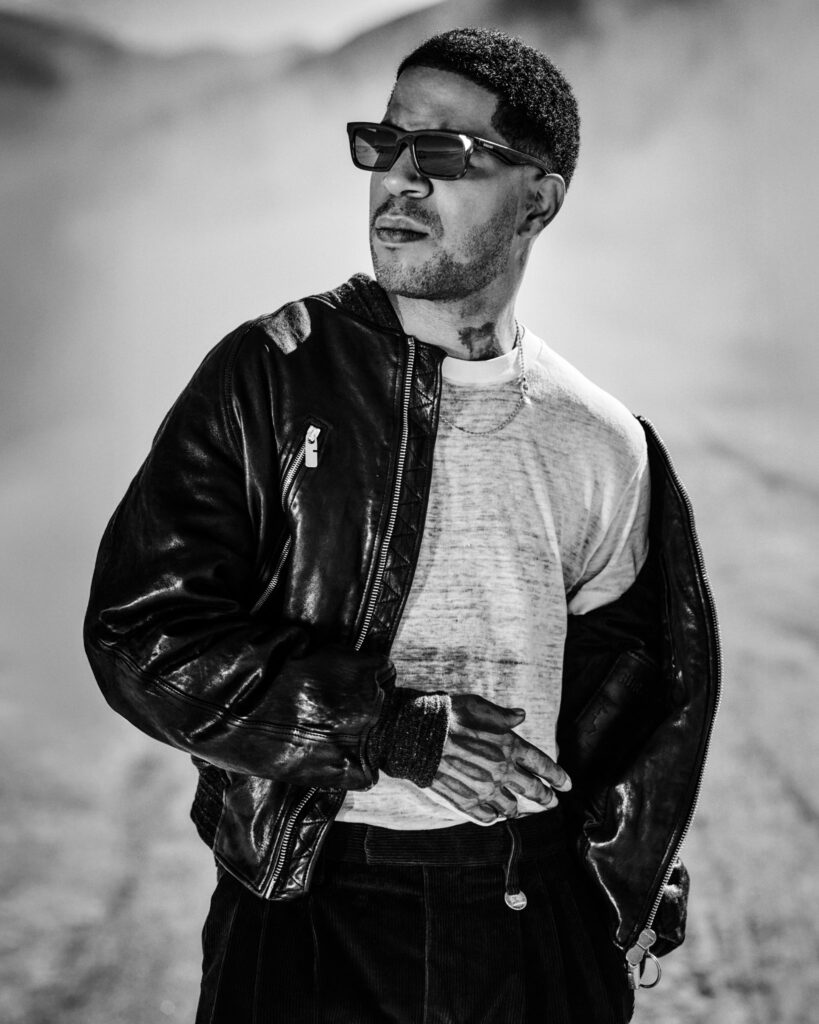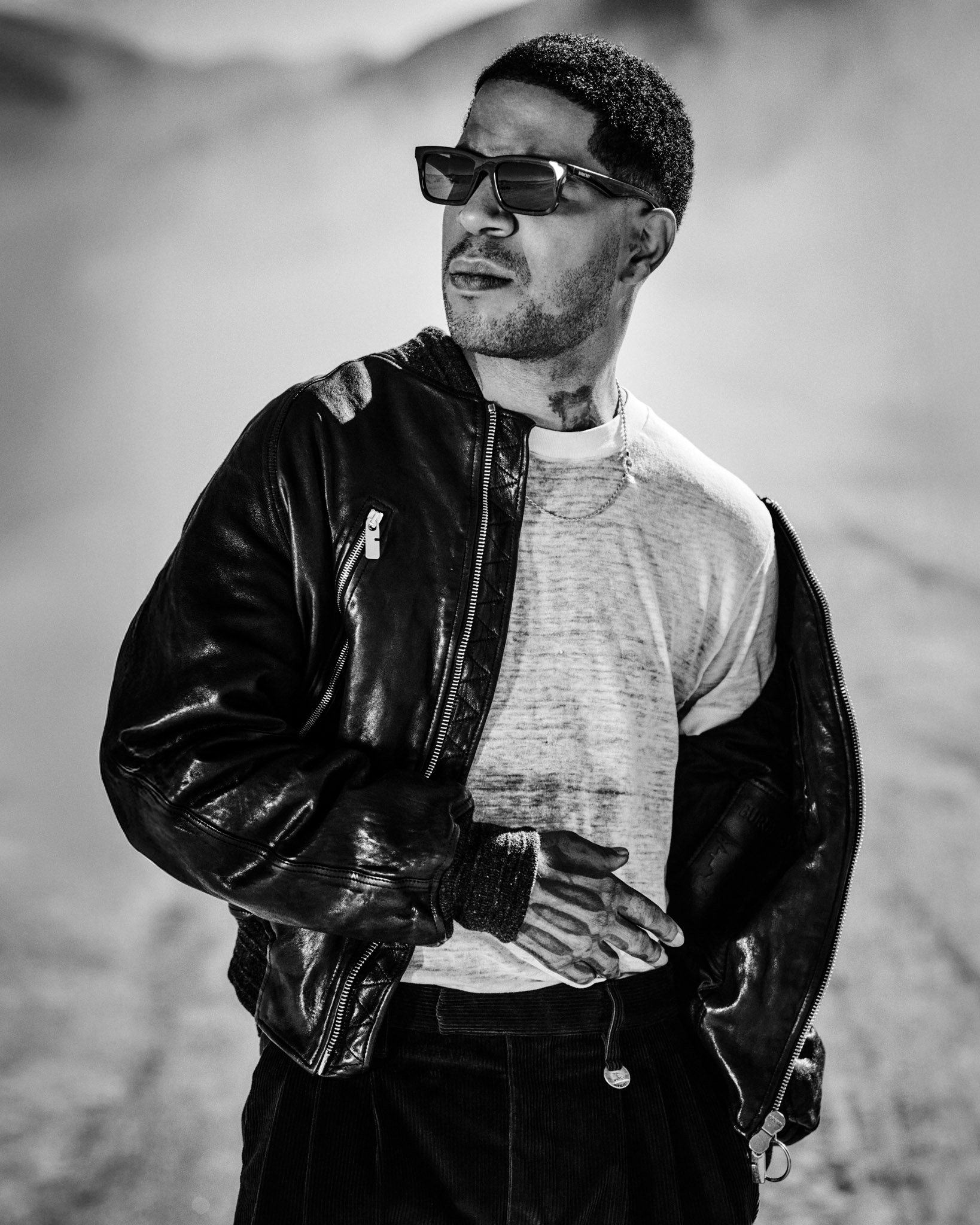Kid Cudi has never been just one thing. Over the past decade and a half, he’s reshaped the sound of modern rap, redefined the emotional range of mainstream music, and built an artistic universe that stretches across film, fashion, literature, and now—painting. Fresh off the release of Free, an album that marks a bold new chapter as he leans into pop textures without abandoning the raw honesty that made him a generational figure, Cudi has continued to expand in every direction at once. He recently released two cinematic short films, Mr. Miracle and Neverland, appeared on-screen in Happy Gilmore 2, published a New York Times–bestselling memoir, and quietly prepared a painting exhibition set to debut in Paris.
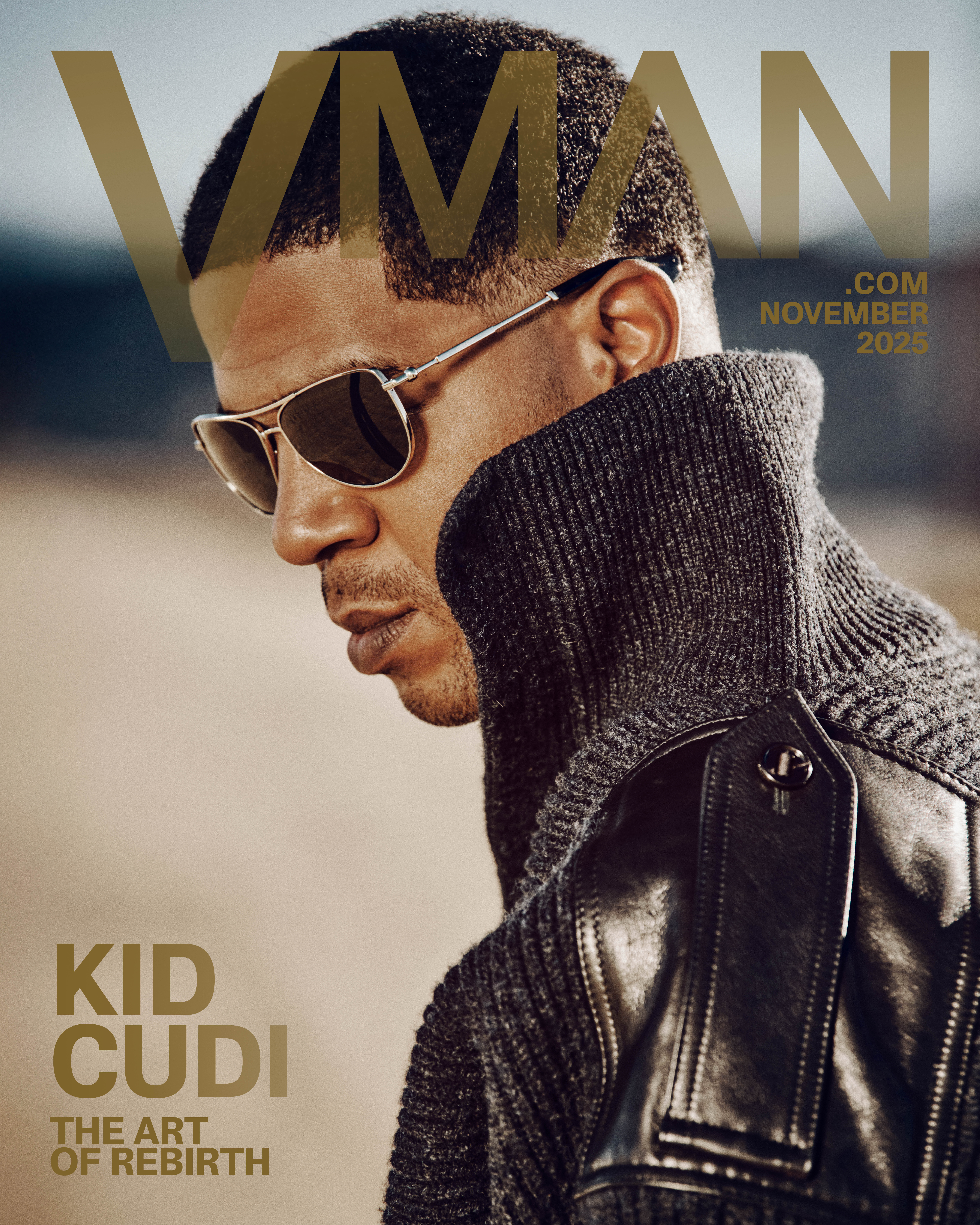
Cudi is a true renaissance man in the 21st-century sense—an artist whose curiosity moves freely between mediums, whose influence radiates across generations, and whose work continues to be loved, remixed, and re-loved by young listeners discovering him for the first time on TikTok.
In this conversation with actor Lakeith Stanfield, the two artists talk about painting, freedom, reinvention, and the timelessness of creation—and why, for Cudi, the act of making art still feels a little like being a kid (Cudi) again.
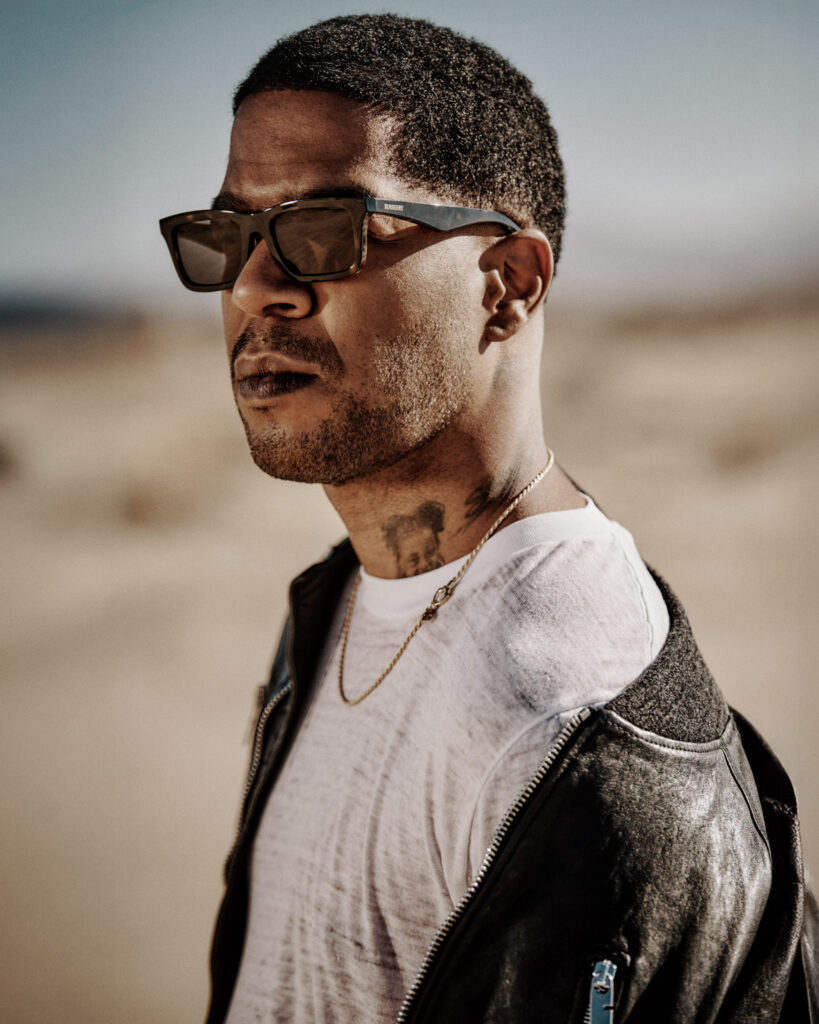
LAKEITH STANFIELD: I’m here with the man, the myth, the legend, the G. First of all, congratulations on your album. It’s amazing. I love it. I love what you’re doing. I love the artwork. Man, it’s beautiful. It’s like you’re flying through this door. It almost reminds me of flying through heaven’s door. It feels like this call to a glorious aspect of your life. And I’m kind of wondering, number one, what inspired that, but also, you have always had these themes of growth in your artistry. And I’m curious about what this new chapter feels like to you creatively, because to us, it feels really beautiful and like this path of healing.
KID CUDI: Well, the album cover, I had something else that I was going to do before I did the shoot. I was going to use one of my paintings for the album cover. And then we did the shoot, and I saw that photo, and I was just kind of like, man, this is so, so powerful of an image, you know, and—hold on, my dogs are going crazy.
LS: Do you believe all dogs go to heaven?
KC: Yes, I do. [Laughs] Okay, I’m back. So what I was saying was, when I saw that image, I just felt— because I knew what we were shooting, we had planned the whole thing and the concept, and I planned the jumping out the door. I had that whole theme figured out in my mind. But actually seeing the image, it felt so strong. I was just like, “Man, this should be the cover.” This is literally saying all the things the album is saying, represented in an image. So that’s how we got on that. And just as far as how I feel on the whole experience in the journey I’ve been on, it’s crazy because I’m a much older man now, and I started this shit when I was 24, 25, and I’ve been running and gunning for 17 years, and the train left the station and never stopped, which has been intense. But now, in the last six or seven years, I’ve been able to appreciate certain things that I didn’t appreciate before. When I used to do shows back in the day, I wouldn’t smile on stage. You didn’t see joy on my face, you know? I mean, I was very serious and I had a job to do, and I didn’t necessarily connect with the energy the kids were giving me. It’s like I didn’t feel it. But now, when I hit a stage, I’m almost on the verge of tears every time I see the kids cheering for me and seeing how many kids showed up. It’s just powerful. So now, at this stage in my life, I can appreciate things a little bit more.
And the journey has been exciting because, as we talked about before, there are so many different things I want to do and get my hands involved in. There’s just no limit to where I can take things, whether it’s with movies or, I was even thinking the other day, I want to write a novel because the memoir did so good. I was like, “Man, it would be dope if I turn one of these scripts I’m working on into a novel.” And the painting is going off. I got my first show in January, on my birthday, in Paris. I got Jeffrey Deitch coming to my art studio, coming to see my paintings. It’s so crazy, I’m not in this place where I think about my younger self and want to be young, like I know a lot of people our age, when they get older, they kind of still wish that they were younger, and think and reminisce about those older times. But I’ve come to learn that the older I get, the more blessings I get. The more I have understanding, the better I get as a human being, and so this whole journey has been crazy. I know that was a long-winded answer, but I feel really blessed, and I’m happy to be here. I’m just, I’m just happy to be here, man.
LS: Well, I think it’s a beautiful answer. And as I said, it’s inspiring to hear from someone who is just a savant and is so good at so many things. And you are open-minded enough to know that you can put your hand in so many things—you’re not limited by the scope of what’s possible. You actually just expand that scope. And I think that it’s important for you. I also think that it’s important for Black men and Black people, to see that in you.
This seems to be a thing that we’ve observed as of late in you, this lightness, this freedom. And I wonder if, for you, there was this point in time in which that happened for you, or if it was like a switch. KC: Man, I think it was like a eureka moment. Kind of a switch flipped in my head when I went to rehab in 2016. When I came out of that, I just kind of wanted to apply myself a little bit more. My ambition was lost, I guess, through the depression, and I wasn’t being the best version of myself. So when I came out of rehab, I was like, “Man, I’m about to go crazy. I’m about to just do whatever the fuck I want to do and just create.” And no matter what, the possibilities are endless. It took me some time to get some momentum, but I think the first thing that really set it off for me—with this new chapter, with producing movies and being prolific in other fields—was Entergalactic. That was the first big project that we started to take on in 2019, and, ever since then, it’s been because Entergalactic did so well. I was like, ‘Man, what else can I do?’ Entergalactic came straight from my brain, like I created that whole concept in my mind; the music, everything was kind of mapped out. And it was a huge undertaking. You know, there were so many different human beings involved with the creation of that show all around the world. And we were able to, well, they were able to bring my vision to life: the animators, Dot [da Genius], my partner, who I’ve been working on music with for my whole career—17 years—and I’ve known him for 20 years. Getting nominated for an Emmy, being up against The Simpsons. All this epic shit was going on. This is what happens when you put your mind to something, and you give it 110%, and you go hard.
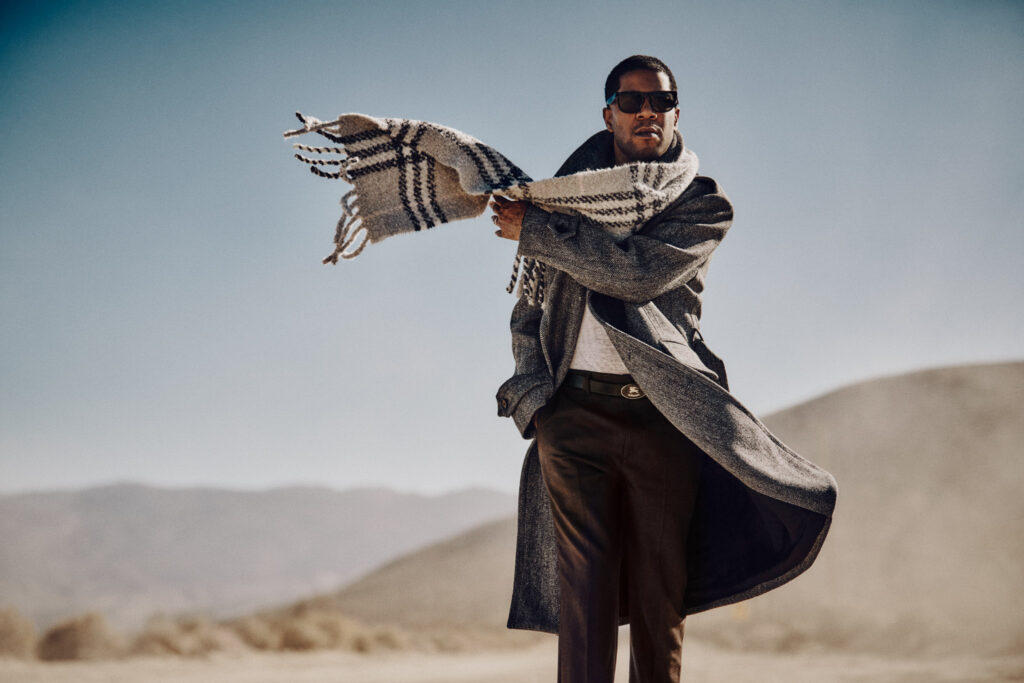
LS: Absolutely. And you even said that that was the greatest piece of art you ever made. Did you also feel like, “Okay, I’ve reached a pinnacle, where do I go?” Or did you also feel like, “Okay, now I’m breaking new ground, and I can just continue to move from here.”
KD: It was more like I’m breaking new ground. It was truly that. And it just opened my mind up to the different directions I could go. I think shortly after that, I started designing my clothing line. I became a designer, and then I started working on my memoir. I took about three years to write it, so I just started flexing my creative muscles, and that’s kind of something that really fuels me, trying to see what else I can accomplish, what else I can learn. Because in life, you’re always learning. You know, if you stop learning, you’re not living, and I am a sponge. I’m very curious, as an actor and as an artist; I just want to expand my mind as much as possible and try new things.
LS: I think that curiosity is a really good marker of intelligence. And so is adaptability, which you’ve also had; you just adapted in so many different ways. It seems that you’ve really moved into this visual space, which is amazing. I wonder if you ever want to direct more and expand that out. I see that you’re making visual art, you’re obviously on the screen, and you’re doing a lot of cool visual things. What do you think drew you to telling stories more visually? Or have you kind of always had that?
KC: I’ve been a fan of film since I was a kid. When I was putting together the first album, it was at the front of my mind to do something that felt cinematic. I wanted to make something where you close your eyes and you literally felt like you were watching the movie. And you know, directing has to be the next step, because I’ve been directing my albums since day one. They’ve all been mini movies. I definitely think, for me, my music is truly all of every ounce of the things that I’m interested in, and I try to put myself in the music as much as possible. So the cinematic tone was basically me saying, “Hey, I want to direct a movie one day, I want to score a movie one day,” things like this. And it’s just, I’ve done a lot of music videos. I’ve directed about six music videos of mine. And I just love directing. We did the Mr. Miracle short film, which was a great experience. That was my first short film, and it came out super dope. And I actually got an offer to direct this horror movie off of my short film, which was really interesting to see an email about a directing job. I was like, “What?” Like, crazy, and I met with the writer and he’s addressing notes and, you know, so that’s gonna come together.
LS: And you like horror films, too.
KC: Oh, I love it. I mean, I think that that’s gonna be, when it’s all said and done, I’m gonna be a Scream King, you know. I feel like that’s a genre that I could thrive in.
LS: Yeah. And so when you make these great—Man, I gotta go back to Entergalactic, because I remember when that was just a really big fucking moment. It was like a cultural moment. And I remember it was just moving and shaking, and it was just reverberating everywhere. Things like that hadn’t really been done. I mean, just from your mind, it became crystallized into this huge project. And I wonder, with things like that—and you’re doing more things like that now—are you approaching it like a director, or like an actor, or just like, “Alright, I got these ideas, and I’m trying to get them across?” KC: I think when I’m writing the script, I’m always thinking like, “Oh, I’m going to direct this.” But then I’m also thinking about it from the perspective of me as an actor, too. When I’m writing a character for myself, I’m always thinking, “Man, what haven’t people really seen for me?” Because I’ve done a lot of work—I’ve been acting for 16 years, but there’s still a lot of things that people just haven’t seen from me. And I feel like you feel that same way too. You’ve done a lot of shit, and you’ve been acting for a long ass time, but there’s still so many different gears that people haven’t seen from you. That’s my hope, that I can kind of keep trying new things and put myself in new worlds and tell new stories. Because that’s my whole thing. All my stories that I write, they’re all unique, they feel like something you haven’t really seen before. That’s important to me because in Hollywood, it’s so crazy, man. I’m so happy I was raised when I was raised, in the ‘80s and ‘90s, because I was just consuming so much awesome shit, so much dope shit. In Hollywood, the creativity is just not there. Every once in a while, I’ll see some shit that blows my mind. Like the other night, me and my wife were watching the first episode of Pluribus, the Vince Gilligan show, who made Breaking Bad. And this shit blew my mind. We were both like, “Oh, this shit is the best pilot we’ve seen ever.” It was just so crazy. And every once in a while, you’ll get some shit like that, you know, you’ll see something that’s really, really fucking dope. There’s hope. And I just want to be a part of the change, as a Black filmmaker and a producer. Just to give people different stories that they wouldn’t normally fucking see.
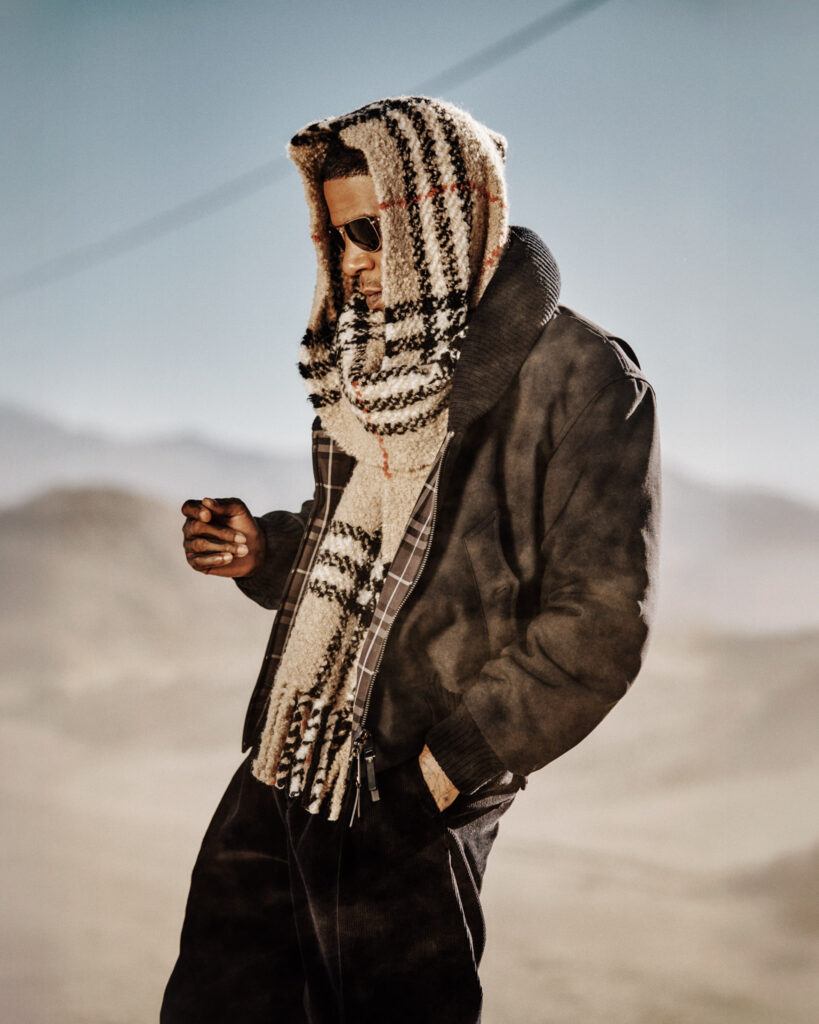
LS: Yeah, absolutely. It’s been dope and inspiring to see, because I feel like it’s also in me, just this will of the baby man, where we’re just like—it’s like the will of the child. And being like, nobody’s gonna kill my imagination. This shit is running free, and I’m gonna allow it to run free.
But you started in this really sort of humble beginning. And ever since you were a child, there are a lot of things that you have now that you’ve always had, and they’re alluded to in your memoir, which is dope, and the cover of it is your own fucking painting, which is exactly how it should be. But writing a memoir, man, that’s a different kind of vulnerability; you had to really dig deep to be able to do that. And I’m just curious, what surprised you the most in creating something in that way, like your memoir, what surprised you the most in that process?
KC: I think that I just remembered a lot of that shit, you know. I mean, I talked to people and they like, “Man, I don’t remember shit when I was 11 years old.” But I remember things in detail, and that’s why I was destined to do this. I mean, this is my destiny. God gave me a mind, and he made me present during a lot of these moments. He gave me a mind that was absorbing all of this shit and keeping it close, memories I’ve had with old friends and all that. It was such an amazing experience for me to reflect on these moments that I haven’t talked about to anyone or haven’t discussed ever. I was rehashing these memories, reliving these moments, and feeling things.
And it was very, very special for me to be able to take that journey from my first memory to my 40th birthday and remind myself of my faults and my mistakes, things that I wasn’t the best human in and learning from that as I’m going through it, and finding answers as I’m telling my story, as well. That was something else. There were some moments where things just started to make sense as I was writing the book and reading the drafts. I just knew that kids would read this book. And, if you’ve been listening to my music, you know, the majority of this book, right? Because I talk about my life in my music, right? But there are still details in the book that I know will inspire generations to the end of time, you know, and that is important to me. That’s why I made the memoir, to help the youth, to connect with young people, to show people like, “Hey, this is what I went through and the mistakes I made, and how I learned from it, and how I was able to grow and see the light.”
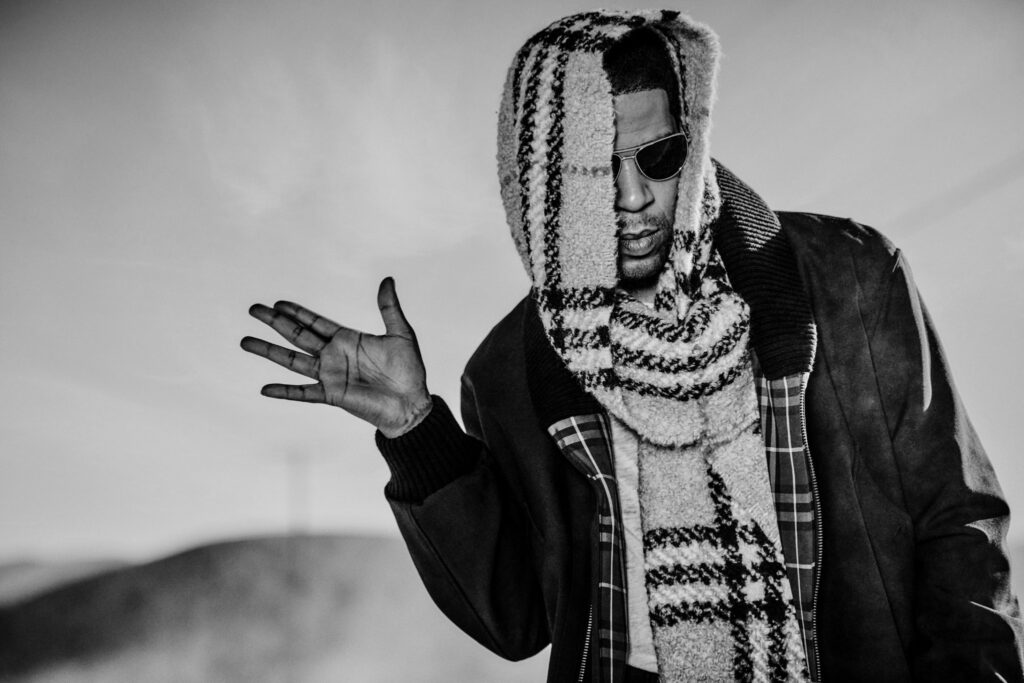
LS: And there are so many of us. There are so many Black kids that sit outside of what has sort of been the popularized version of what pervades in our culture; there are so many different facets. I mean, we come in so many different sizes, shapes, styles, and expressions. So I think that is dope to breathe life into that, because it’s a very real thing for most of us. Even the kids in the hood, I believe, are the same kids that have these brilliant, huge minds. They’re just in environments where it’s not easy and/or safe to exercise that, and we live in a world where it’s dangerous for a Black man to show up outside of his expected way to be.
And regardless of that, you continue to show up in your authenticity, and it happens in your clothing: the way that you dress, your style, and in your work. And I think that’s fucking beautiful, and I think it’s necessary, and I also don’t think it’s easy, so it’s commendable.
But I wanted to ask—what is the earliest memory you have?
KC: Oh, man, I actually put it in my memoir. So, my first memory, I think I was three years old. I was sitting in the back of my mom’s car with my siblings. It’s a Chevy Chevette, a gray Chevy Chevette, like ‘82 or something like that. And I remember looking out the window and seeing my mom and dad getting into a really intense argument. Really intense, screaming at each other or whatever. And I remember my sister turning me back forward and telling me to look straight ahead, and that’s when the memory ends. I don’t have a lot of memories, but the first memory is this moment. And I talk about how this kind of set the tone and the undercurrent of what was happening in my life. You know, for the next 20, 25 years, it was just the darkness and the dysfunction. And, I don’t know, man, I know some people have more pleasant first memories, but mine was not, and I found out later that that was when my mom told my dad that she wanted a divorce. So it was a really big moment in their lives that I just happened to witness, and it stuck with me my whole life as my earliest memory. I don’t, I don’t, I don’t remember anything before that.
LS: It’s kind of interesting because I feel like the only way that we truly have growth is when we have these kinds of hard times. What we want to try to achieve, I think, is a controlled tension that allows you to be able to experience hard things and get through them, but it’s controlled in a way where you’re not super traumatized. But I guess my philosophy is that a little trauma is good because it moves you in certain directions. But sometimes it has a funny way of driving you into finding your path and finding your way. But, on a happy note, Happy Gilmore! You’re in Happy Gilmore. Happy Gilmore 2. And that’s such a fun fucking project. What appeals to you about that? And how did you find that?
KC: Happy Gilmore was the movie of all movies when I was a kid. I watched that shit so much as a kid, I’ve definitely seen Happy Gilmore hundreds of times in my life. And it was such a surreal moment just being there in a scene with Adam Sandler, Ben Stiller, Chris Farley’s brother was there. I mean, Chris [Farley] is probably like my God, you know what I mean, and to see his brother there. And Kim Whitley was there, who’s a Shaker Heights legend. She comes from the same part of town I come from, back home in Cleveland. Seeing her was great. It was just such a dope once-in-a-lifetime experience. Like, I’ve done a lot of things, man. Even when I did Bill and Ted 3, it was the same thing. Being with Alex Winter and Keanu [Reeves], these were dudes I grew up on. I loved the Bill and Ted movies when I was a kid, so it was the same feeling of just being like, “Fuck.” I’m in a scene with these guys. Like, this is unreal. And Adam Sandler, I used to watch him every Saturday as a kid. Every Saturday, he, Chris Farley, Tim Meadows, and David Spade, all those guys. I used to watch them. And Ben Stiller, I’ve seen all his movies. He’s a comedy legend. The Cable Guy is my favorite movie and he directed and had a small part in it. That’s one of my favorite Ben Stiller pieces of art. It was just fucking crazy, man, and I was having out-of-body experiences, just watching what was unfolding in the scene. I was almost forgetting my lines because I was doing this scene with Ben and Adam, and I had the line to deliver and then Ben had his line. And I snapped out of the character because I was watching Ben’s performance as a fan, you know, it was so crazy. And I forgot I had lines, and I missed my lines a couple times because I was so fucking in the moment, just like, “Oh my god, this is Ben Stiller being Hal L., this dude is so fucking funny in this character.”
LS: Adam is such a sweet guy. That’s such a cool group of people to be around and it’s a dope feeling when you look up and you’re like, damn, I used to be watching you.
This period of your life is so exciting, man. How does this new energy that you have affect your work day to day? Do you feel lighter? How does it feel for you?
KC: I definitely feel lighter. Sometimes I have to snap myself out of it because I’m so used to things going wrong or there always being something that’s fucked up, whether it’s in a relationship or just other things in my personal life, stressful things. But I have to realize, I’m like, “No man, life can be good, there’s nothing wrong right now, Scott. What are you looking for? What are you doing? Like, nothing’s wrong. Why are you searching for something? This is how life is supposed to be. It’s supposed to be chill. There’s so many people who live very peacefully, and that can be your reality.”
And I have to kind of take a step back and go like, “Damn, I’m at total peace. I have amazing things happening in my life. I’m doing things I’ve always wanted to do. I’m seeing new things and learning new things and growing and making new friends.” I don’t know, it’s fucking crazy sometimes that I never imagined I would be this way, like when I was going through it. I never imagined, I never saw this side of my life. And now that I’m here, it’s almost like I can’t even imagine myself on the other side. I can’t imagine I was so low and depressed and dark. I’m kind of, like, “Man, how the fuck could you feel that way? How could you, like, want to kill yourself? Or, like, how could you be that dark? You know, life is so beautiful. Like, how could you not want to be here?” And so I have those thoughts sometimes because I’m so far removed from that time that it’s almost like it was another lifetime, you know? So, yeah, I’m just so fucking happy. And even just connecting with you and having our friendship that we just kind of started. It just lets me know that, man, “You’re still gonna make some friends, and you’re gonna meet good people. There are some good people in this industry that you can meet, Scott. There’s people in the world that you can connect with that are probably going to be lifelong friends.” It’s just nice, man, because in hip hop I don’t have many alliances. I have maybe, like, four alliances in hip hop. I don’t rock with any of the people that I used to rock with. There’s literally four people, like Denzel Curry, Jaden [Smith], you, and who else? That’s it, just you guys.
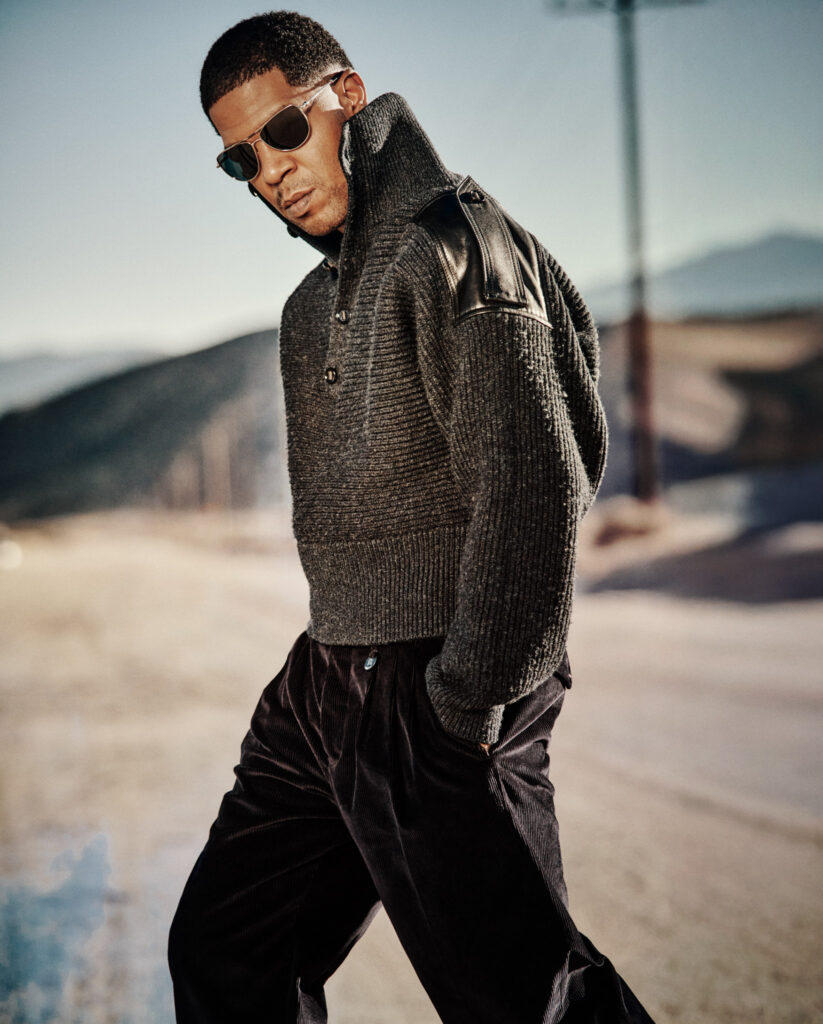
LS: Well, I’m honored to be inducted into the group, I must say. That’s exactly how I do it. You keep the circle small. You know, it’s people that appeal to you, people that are real and grounded, and you keep it at that. You ain’t got to have no big ass group.
When you think about what’s next, the films, the art, the music, is there a through line connecting it all, or are you intentionally just letting things unfold without a grand plan, and kind of just riding this thing?
KC: Well, there is a through line. So, like with anything that I’m creating, it needs to help people. It needs to give people some answers and some guidance. Whether I’m doing a movie or painting or anything, or writing a book, it’s gotta inspire people and help them in some way. And I find that, like the characters that I write in my movies, they’re all dealing with something: addiction or just depression or from a loss, or any number of things, a broken relationship. It’s a character actually dealing with some deep things. That’s kind of the through line for me. I need to say something important. I’m not just doing this just to fucking do it. Even my paintings are not just me; they always have to have a purpose. You know, none of this shit is an accident. Everything has been well thought out, every album, every painting, you know? I mean, everything has a whole purpose, and it’s all a part of the plan.
LS: Love it, and I have a great time interpreting your paintings, just trying to be like, “I wonder how this sits in me, you know?” You’re actually preparing for a painting show in Paris, which is fucking amazing. What does that outlet give to you that you think the other ones don’t? Is there a part of it that feels specific?
KC: Yeah, it’s definitely a childlike feeling that I get from painting that I don’t get in anything else that I do. You know, it’s the only thing in my life where I feel like a kid again.
LS: Do you sometimes just go in there and throw paint at the wall, literally, just to figure out what you like? How do you start the process? Or do you see it in your mind first?
KC: Yeah, I see it. I see it first, and then I usually sketch it. Sometimes I don’t sketch. Sometimes I just go because I have a vivid visual in my mind, and I know what I’m going to do. But sometimes I sketch just to understand where I’m going to place things and what’s going to fit in the frame. But, yeah, I always have an idea.
LS: Before you paint, do you “visit Maui?”
KC: I smoke a little bit, for sure. Definitely, I smoke. I’m always a little wavy when I’m painting. It’s great just sitting there in my studio smoking a joint, painting like, blunt hanging out of my mouth, you know, brush in my hand.
LS: It’s a fucking dream, man. A whole generation is discovering your music again on TikTok. What does that feel like?
KC: Oh man, it’s fucking crazy because you just see the power of music. It’s so validating to know that something I did 17 years ago is resonating now, and it’s just a song about smoking weed, a really rare, rare strain of weed, and chillin’ in Hawaii. And I was very young, just trying to make a little stoner song, and I don’t know, it’s just, it’s beautiful. It’s beautiful. It makes me so happy just to see this bringing so many people joy—it’s the power of music, man. It’s timeless. Shit from my mixtape is timeless, and I can’t even take full credit for that song. That was a Grind Mode record, and I kept the music as is; I kept the hook as is. So it was their energy too, you know? And it was just a combination, it just fucking made sense. And back then, people loved it, and even now, people are loving it. So shout out to Grind Mode. This is a win for all of us.
LS: You being an artist is a win for all of us. Thank you so much, man. Your artistry will definitely stand the test of time. It already has. And continues to touch people, continues to move people. The things that you’re making now will continue to echo into forever, and I’m happy to be a small part of that journey. So thank you. And man, this was awesome. And anytime I’ll do it again, it was beautiful to hear from you.
KC: Oh, man, thank you so much. Lakeith man, love you, bro. I appreciate you doing this. This means so much. Thank you.
LS: Anytime. Talk soon, bro, be well.
KC: Alright, bet. Peace.
Photographer Matthew Brookes
Fashion Anna Trevelyan
Editor-in-Chief / Creative Director Stephen Gan
Interview Lakeith Stanfield
Grooming Brielle McKenna
Hair Sy
Editor Mathias Rosenzweig / Kev Ponce
Bookings Director Goran Macura
Production Michael “Skiny” Power (Cowboys & Indians)
On-set Production Natalie Stevenson
1st Assistant Brian Kendall
2nd Assistant Arden Core
Digital Technician Stowe Richards
Styling Assistant Damien Lloyd
Props/PA Chris Katus
Special Thanks Sandrine Bizzaro
Discover More
